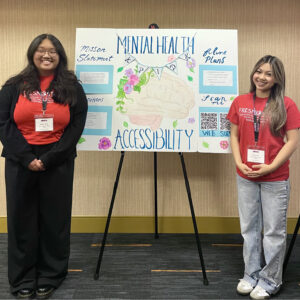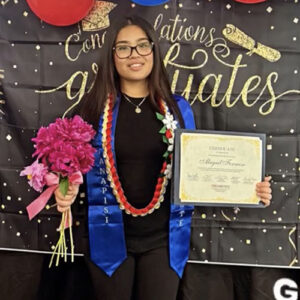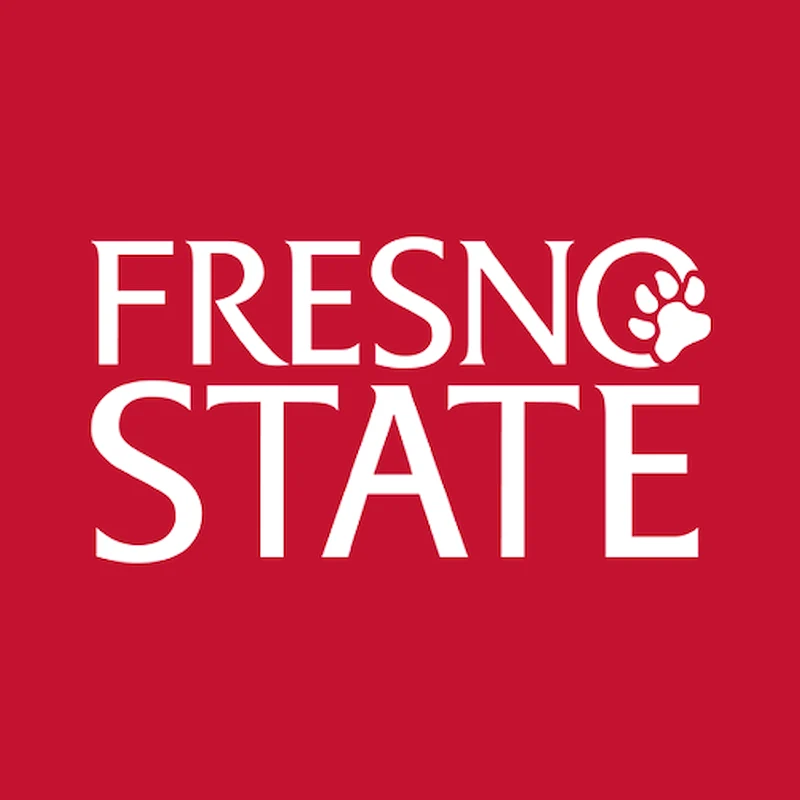Ginger Hang, a junior majoring in public health, grew up in a family that always emphasized education, partly thanks to Fresno State.
Her mother, Youa Lor, and father, Dang Hang, are Fresno Unified School District elementary school teachers and proud Fresno State graduates. They attended college with U.S. government assistance after they had escaped Laos during the Vietnam War in the 1970s.
Hang’s elder brother, Ryan, and sister, Jasmine, also both received their bachelor’s and master’s degrees from Fresno State.
Now as a Fresno State student, Hang is working to support her fellow students through the Asian American and Native American Pacific Islander-Serving Institutions Initiative led by the Department of Criminology.
The program, which started in 2021, offers students career development, mentoring and community outreach opportunities. It is intended to help enhance campus graduation and job placement rates by fostering a welcoming environment on campus and connecting students directly with research and work-based experiences. While the program exposes students to criminology-related principles and careers, it is open to students in any major.
A Fresno State crowdfunding campaign is being held through Nov. 30 to generate support to keep the initiative alive, as the grant that helped establish the program is set to expire in 2026.
Over the past two years, Hang teamed with junior Destiny Lor to create a website that will help students find support resources. By surveying and interviewing Asian Americans of all ages from the Central Valley, Hang and other students are using a wide range of perspectives to spotlight sensitive topics tied to mental health and well-being on the website.

“This program has given me a whole new perspective on my culture and community,” Hang said. “Talking about mental health and stress management can be taboo, so this project has the potential to make a big impact. Having these personal conversations has helped me develop new skills and become more outgoing. It’s even given me the confidence to think about graduate school and other ways I can make a positive impact on others.”
Hang’s work with the project connected her in new ways with her grandmother, also an immigrant, who came to the United States in the late 1970s. In their conversations tied to the project, Hang learned about her grandmother’s refugee experience escaping war and the passing of her husband in the late 1970s.
Since she was nudged to attend her first program meeting by her older sister, Hang has become a student leader in the Richter Center’s community service program and as the public relations officer and judicial officer for the campus Hmong Student Association.
“Public health and criminology can be connected when you factor in things like the deterioration of mental health, and racism that Asian Americans and other ethnic groups face,” Hang said. “Being able to access and better understand these perspectives leads to stronger and more resilient individuals and communities.”
Enhancing student support and professional pathways
Peer-mentoring, the other primary focus for students in the grant-funded program, is a portal for professional development opportunities for students like Abbie Formoso, a first-generation college student with Mexican and Asian family ties.
The 21-year-old senior from Stockton admits she is not a trained professional, but more of a peer-centered, empathetic ear who can suggest campus resources for professional support.
“I love my mentees and learning about their lives,” Formoso said. “I’m open to whatever they feel they need to talk about, because everything can affect them as a student. We create short- and long-term goals, and seeing their progress helps motivate me.”
Students can also attend ED Talks on a host of professional, academic and social issue topics. The events are open to the community and offer free food and boba drinks.
Formoso has taken advantage of other programming that helps students learn about different criminology, forensic science, victim support and related careers earlier in their academic journeys.

The program offers a chance to meet other professionals at spring events like the Higher Education and Student Affairs in the Central Valley Conference and the Asian Pacific Americans in Higher Education Conference, as well as valuable field trips to places like correctional centers, court houses, probation and counseling centers and non-profit organizations.
Connections through annual career fairs, field trips and meetings with industry speakers each semester have motivated Formoso to join the Fresno Police Department Cadet 1 training program. She’s currently assigned with the crime scene investigations unit, and she expects to finish this first stage of training next spring, and then complete the final stage of attending the police academy next summer and fall.
With an eye on possibly becoming a detective, she’s also considering getting a master’s degree and is looking for ways to integrate the two areas.
“From a career standpoint, everything has come together so quickly,” Formoso said. “I’ve always had an interest in the criminology field, but meeting people who work in the field and seeing their operations has made a big difference. There are so many different areas to consider, and many we don’t know about, so this program offers important direction.”
The career fair returns to campus on March 26. Last year, professionals from about 50 organizations statewide shared information about internships and careers.
“A lot of students don’t get into internships until their junior and senior year, so this is a great way for them to explore potential opportunities a year or two earlier than they might normally,” said Lisa Xiong, an alumna and Student Success Project coordinator for the program.
“They may think they want to go into a traditional law enforcement organization, but when they visit probation offices or other support services organizations, they see a whole new world of careers that they never knew about.”
Visit https://crowdfunding.fresnostate.edu/project/48375 for more information on the crowdfunding campaign to support the Asian American and Native American Pacific Islander-Serving Institutions Initiative.


